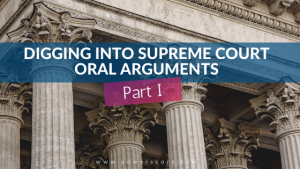If you’ve spent much time with Logical Reasoning on the LSAT, you’ve recognized that the answer choices, right and wrong, are masterfully crafted. The test makers are unbelievably adept at disguising correct answers, and making the incorrect options look extremely attractive. Fortunately there’s a step in the question-attack process designed specifically to help you navigate through the answers: Prephrasing.Prephrasing is the intermediate … [Read more...]
The LSAT Wisdom of Johan Cruyff
Ten days ago the world lost a sporting legend, Johan Cruyff. If you've never heard the name before, you could be forgiven for thinking that he might be an old ship captain, or maybe some forgotten inventor. The name sounds a bit grizzly and angular, and would certainly fit a big game hunter or gold miner. He wasn't though—he was a world famous soccer player from the Netherlands. So, how could he possibly have any wisdom that applies to the … [Read more...]
Conditional Diagramming Part V: Advantages of the Unless Equation
Students often ask if there is an easier way to handle conditional statements containing necessary condition indicators such as “unless,” “except,” “until,” and “without.” The Unless EquationTM This is relatively simple, but it does involve a two-step process:Whatever term is modified by “unless” becomes the necessary condition. The remaining term is negated and becomes the sufficient condition.For example, consider the … [Read more...]
Digging into Supreme Court Oral Arguments Part I
A question we get frequently is what to do when you want to continue studying for the LSAT but you need a break from drills and questions. One fantastic resource is the Oyez Project, an online archive of Supreme Court of the United States (SCOTUS) oral arguments, currently maintained by the IIT Chicago-Kent College of Law. In this post, we'll give you a short introduction to the Oyez Project and links to a few of the most interesting oral … [Read more...]
Conditional Diagramming Part IV: Working with “Only”
We are continuing our Conditional Diagramming discussion today with the word “only” which is used frequently in LSAT questions. “Only” is a necessary condition indicator, and its usage is often easy to parse. Here’s an example: Only doctors carry malpractice insurance. “Only” modifies “doctors,” and thus the proper diagram is: Carry malpractice insurance → doctor However, in a number of instances, “only” is used in a way that is more … [Read more...]
Your Busted Bracket and the LSAT
If you're like nearly everyone who submitted picks for the NCAA men's basketball tournament this year, chances are exceptionally good that your bracket at this point is a mess. "Busted," to use the parlance of those who take these things somewhat seriously. I say that because attempting to predict winners and losers over the span of 67 match ups (give or take) is bound to meet some difficulties. This year's games seem especially determined to … [Read more...]
Speaker Identifiers in Logical Reasoning
In a number of LSAT Logical Reasoning questions, the first thing you see is an identifier of the type of speaker making the argument that follows. For example, you might see “Archaeologist,” or “Researcher,” or "Expert,” to name three examples from a recent LSAT. Most students fly right by these speaker identifiers without further thought, but should they? Probably not, so let’s talk about why that is the case. Speaker Identifiers Do Not … [Read more...]
Accommodations for the LSAT Part V: The Controversy Continued, DOJ Joins the Party
Part 1 of this discussion dealt with a case that LSAC filed in response to recent California legislation regarding the issue of "flagging" LSAT scores (distinguishing the score reports of those with special accommodations from those who take the LSAT under standard conditions). In that case, LSAC was successful in its challenge to the brand new legislation, but then later agreed to stop the practice. Part Two deals with a major cases filed … [Read more...]
Get Your Daily LSAT Fix
We know you secretly want it: your daily LSAT fix. No, you don't need to call your dealer or risk a felony charge. But, let's face it: the LSAT is a controlled substance, and quantities are limited. There are only a certain amount of past official LSATs publicly available. Even with access to everything LSAC makes available, you may still want some variety from the daily grind. Maximizing your LSAT score sometimes requires taking a break from the … [Read more...]
Conditional Sequencing Rules in Logic Games
We're now ten weeks away from the LSAT, which still gives you plenty of time to prepare and reach your goals, but the clock is certainly ticking--if you're waiting for your course to begin that's fine!; if you haven't thought about how you intend to prep, however, it's time to get going.And even though it's still fairly early I regularly hear from anxious test takers, and unsurprisingly Logic Games often weigh most heavily on their minds. I … [Read more...]
“Most Strongly Supports” vs. “Most Strongly Supported” in Logical Reasoning Questions
Let’s look at two LSAT logical reasoning question stems that sound awfully alike, but are anything but: "Which one of the following, if true, most strongly supports the argument above?"vs. "Which one of the following is most strongly supported by the information above?" In the first instance, your job is to assume that each answer choice represents a true statement, and then determine which one is most helpful to validating the conclusion … [Read more...]
Improbable Doesn’t Mean Impossible: LSAT Lessons from the NCAA Tourney
Tonight, the NCAA Basketball Tournament returns to action, and one of the notable games pits Texas A&M against Oklahoma. Why is this notable? Because there's no way Texas A&M should be in this game. But they pulled a miracle escape against Northern Iowa and won the game in double overtime. As always, whenever I watch sports, thoughts of the LSAT aren't far from my mind. The question is, what can we learn from their incredible comeback, … [Read more...]
Sterling Archer’s Many Flaws: Do You Want Ants?
Archer, an animated series on FX, is about a spy agency and its group of clever, often bitingly sarcastic secret agents, who provide some great examples of the same kinds of logical flaws that we see on the LSAT:Ad Hominem Argument This type of flawed logic, often called a “source argument” describes an attack directly on the speaker, or the source of the argument, rather than on the merits of the argument itself.A great example appears … [Read more...]
Cheating on the LSAT Part II: Enforcement
Part 1 of this blog can be found here.LSAC Cheating Prevention Protocols To prevent cheating, over the years LSAC has gradually tightened restrictions on test takers in test centers (picture ID, no cell phones, etc.) These protocols are in place to help assure LSAC that you are who you say you are, and that you can't easily communicate with other test takers during the exam. But the security measures don't stop there. LSAC has also … [Read more...]














